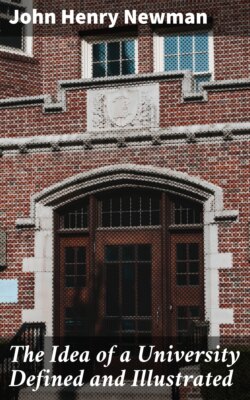Читать книгу The Idea of a University Defined and Illustrated - John Henry Newman - Страница 45
На сайте Литреса книга снята с продажи.
10.
ОглавлениеTable of Contents
I will now take an instance from another science, and will use more words about it. Political Economy is the science, I suppose, of wealth,—a science simply lawful and useful, for it is no sin to make money, any more than it is a sin to seek honour; a science at the same time dangerous and leading to occasions of sin, as is the pursuit of honour too; and in consequence, if studied by itself, and apart from the control of Revealed Truth, sure to conduct a speculator to unchristian conclusions. Holy Scripture tells us distinctly, that “covetousness,” or more literally the love of money, “is the root of all evils;” and that “they that would become rich fall into temptation;” and that “hardly shall they that have riches enter into the kingdom of God;” and after drawing the picture of a wealthy and flourishing people, it adds, “They have called the people happy that hath these things; but happy is that people whose God is the Lord:”—while on the other hand it says with equal distinctness, “If any will not work, neither let him eat;” and, “If any man have not care of his own, and especially of those of his house, he hath denied the faith, and is worse than an infidel.” These opposite injunctions are summed up in the wise man's prayer, who says, “Give me neither beggary nor riches, give me only the necessaries of life.” With this most precise view of a Christian's duty, viz., to labour indeed, but to labour for a competency for himself and his, and to be jealous of wealth, whether personal or national, the holy Fathers are, as might be expected, in simple accordance. “Judas,” says St. Chrysostom, “was with Him who [pg 087] knew not where to lay His head, yet could not restrain himself; and how canst thou hope to escape the contagion without anxious effort?” “It is ridiculous,” says St. Jerome, “to call it idolatry to offer to the creature the grains of incense that are due to God, and not to call it so, to offer the whole service of one's life to the creature.” “There is not a trace of justice in that heart,” says St. Leo, “in which the love of gain has made itself a dwelling.” The same thing is emphatically taught us by the counsels of perfection, and by every holy monk and nun anywhere, who has ever embraced them; but it is needless to collect testimonies, when Scripture is so clear.
Now, observe, Gentlemen, my drift in setting Scripture and the Fathers over against Political Economy. Of course if there is a science of wealth, it must give rules for gaining wealth and disposing of wealth, and can do nothing more; it cannot itself declare that it is a subordinate science, that its end is not the ultimate end of all things, and that its conclusions are only hypothetical, depending on its premisses, and liable to be overruled by a higher teaching. I do not then blame the Political Economist for anything which follows from the very idea of his science, from the very moment that it is recognized as a science. He must of course direct his inquiries towards his end; but then at the same time it must be recollected, that so far he is not practical, but only pursues an abstract study, and is busy himself in establishing logical conclusions from indisputable premisses. Given that wealth is to be sought, this and that is the method of gaining it. This is the extent to which a Political Economist has a right to go; he has no right to determine that wealth is at any rate to be sought, or that it is the way to be virtuous and the price [pg 088] of happiness; I say, this is to pass the bounds of his science, independent of the question whether he be right or wrong in so determining, for he is only concerned with an hypothesis.
To take a parallel case:—a physician may tell you, that if you are to preserve your health, you must give up your employment and retire to the country. He distinctly says “if;” that is all in which he is concerned, he is no judge whether there are objects dearer to you, more urgent upon you, than the preservation of your health; he does not enter into your circumstances, your duties, your liabilities, the persons dependent on you; he knows nothing about what is advisable or what is not; he only says, “I speak as a physician; if you would be well, give up your profession, your trade, your office, whatever it is.” However he may wish it, it would be impertinent in him to say more, unless indeed he spoke, not as a physician but as a friend; and it would be extravagant, if he asserted that bodily health was the summum bonum, and that no one could be virtuous whose animal system was not in good order.
